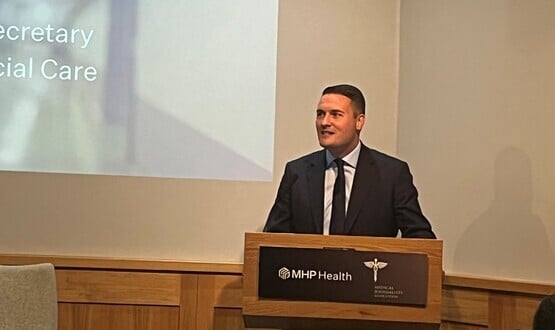What is the Covid-19 passport? Your questions answered
- 13 May 2021

Last week the government announced the NHS App would be ready to be used as a Covid-19 passport from May 17 when some international travel is allowed.
The app will be used as a digital solution for people to prove their vaccination status, with non-digital solutions also being considered.
But what is a Covid-19 passport, who will be able to use one, and what should you do if you don’t have a smartphone?
What is a Covid-19 passport?
The idea behind Covid-19 passports is that they could be used to prove vaccination status when travelling.
This could, in theory, mean travellers could easily move between countries without the need to quarantine.
Currently, the UK government has suggested the passports will only be used for international travel and won’t be required to enter events in the UK.
Government guidance suggests those traveling abroad will still need to check the Covid requirements of the country they are visiting, as there are few who are accepting Covid-19 passports.
“There are not many countries that currently accept proof of vaccination. So for the time being most people will still need to follow other rules when travelling abroad – like getting a negative pre-departure test,” it states.
If you’re travelling overseas you should:
- check the entry requirements for your destination country on gov.uk
- get up-to-date information from the website of your destination country
How will it work?
The government announced in April that the NHS App will be used as a Covid-19 passport.
The NHS App already allows users to access a range of NHS services on their smartphone or tablet, including vaccination records.
It was launched in 2018 and offers services including symptom checking and triage; appointment booking; repeat prescription ordering; access to patient records; national data opt-out; and organ donation preference.
It now has more than 3.5 million users, but only 2.5m of those users have fully verified their identity to allow them to access services including GP appointment booking, repeat prescriptions, and access to their health records.
Users can check their vaccination status through the app if permitted by their GP. This applies to all vaccines.
The government is recommending people register with the NHS App before booking overseas travel.
The NHS App is separate from the NHS Covid-19 app which was designed specifically as a contact-tracing app.
When will it be used in England and who is eligible?
Transport secretary Grant Shapps confirmed last week that Covid-19 passports will be ready to use by May 17.
To use the app you must be registered with a GP in England. The government is recommending people register with the app before booking international travel and at least two weeks before the departure date.
Currently, the Covid-19 passport can only be used once a person has had a full course of vaccinations – that means both jabs.
What if you haven’t had both jabs?
Undoubtedly many who haven’t had, or cannot have, the vaccine will be worried it will impact their ability to travel.
As mentioned above, many countries aren’t accepting Covid passports as proof of vaccination, so it is unlikely to impact your immediate ability to travel. This could change in the future if vaccination passports become internationally recognised, but we don’t yet know how that will work.
Government guidance for people who haven’t been vaccinated suggests they should follow the entry requirements of the country they are travelling to.
This will likely include proof of a negative Covid test upon arrival. Some countries also require people to quarantine on arrival, so be sure to check advice before travelling.
Details on entry requirements for different countries can be found on the gov.uk foreign travel advice pages and on the websites of your destination country.
Are there any security risks with using Covid-19 passports?
As with the use of any sensitive data, there will always be concerns related to privacy when using the NHS App as a vaccine passport.
Government guidance assures that vaccination status is held securely within the NHS App, and can only be accessed via the NHS login service.
The app only shows Covid-19 vaccination status in the form of your vaccination record. In the future the app will also be used to show Covid test results.
In an interview with Digital Health News about the potential impact of Covid-19 passports Eerke Boiten, professor in cyber security at De Montfort University in Leicester, said a strong authentication system would need to be in place to ensure privacy and proper use.
“In terms of privacy risks, I don’t think it adds significantly to the risks that are already in the NHS App itself,” he said.
“The NHS App has sensitive information about prescriptions in there. Having that on your phone, with the right security measures, is already a situation where we need to worry about making sure sensitive information doesn’t leak.”
He added a data protection impact assessment would need to be carried out before Covid-19 passports are rolled out to ensure privacy and security.
What about people who don’t own a smartphone?
The NHS App is just one way the government is looking to implement Covid-19 passports. They are looking at a mixture of digital and non-digital options.
The government has set up a helpline for people who require a Covid-19 passport to enter the country they are travelling to but do not have access to a smartphone.
By calling 119 people can ask for a letter detailing their vaccination status to be sent to them.
This must be done at least five days after your second dose of the vaccine and will take a further five days to reach you, according to government guidance.





2 Comments
It it still not clear. If I have a covid vaccine passport do I still have to quarantine on return from an amber country
Admin please delete if not allowed:
For a comprehensive patient guide on how to download and register on the NHS App, please click https://www.digitalhealthcoachuk.net/howtoregisteronthenhsapp
Comments are closed.